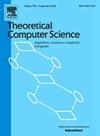实现强后悔最小化集:平衡数据选择的新鲜度和多样性
IF 1
4区 计算机科学
Q3 COMPUTER SCIENCE, THEORY & METHODS
引用次数: 0
摘要
多标准决策通常需要从大型数据库中选择具有代表性的简明集合。遗憾最小化集(RMS)查询作为一种解决方案应运而生,它规避了 top-k 查询中效用函数的必要性,并解决了天际线查询产生的庞大结果集问题。然而,传统的 RMS 公式只能确保在任何效用函数下都有一个结果,而且不考虑结果的多样性和新鲜度。本研究引入了强遗憾最小化集(SRMS)的概念,在任意效用函数下确保所选 k 个数据点的效用值准确性,同时考虑结果的多样性和新鲜度。我们探索了两个新的计算挑战:最小尺寸问题(侧重于在效用误差受限的情况下缩小结果集尺寸)和最大总和多样性和新鲜度问题(旨在优化所选结果集的多样性和新鲜度)。这两个问题都被证明是 NP 难问题,我们为它们开发了近似算法。在真实世界和合成数据上的实验结果表明,所提出的算法具有很高的效率和可扩展性。本文章由计算机程序翻译,如有差异,请以英文原文为准。
Towards strong regret minimization sets: Balancing freshness and diversity in data selection
Multi-criteria decision-making typically requires selecting a concise, representative set from large databases. Regret minimization set (RMS) queries have emerged as a solution to circumvent the necessity of a utility function in top-k queries and to address the expansive result sets produced by skyline queries. However, traditional RMS formulations only ensure one result under any utility function and do not account for the diversity and freshness of results. This study introduces the concept of strong regret minimization set (SRMS), ensuring the utility value accuracy of selected k data points under any utility function while incorporating result diversity and freshness. We explore two new computational challenges: the Minimum Size problem, focusing on reducing the result set size with bounded utility error, and the Max-sum Diversity and Freshness problem, aiming to optimize the diversity and freshness of the selected set. Both problems are proved to be NP-hard, and we develop approximation algorithms for them. Experimental results on both real-world and synthetic data show high efficiency and scalability of proposed algorithms.
求助全文
通过发布文献求助,成功后即可免费获取论文全文。
去求助
来源期刊

Theoretical Computer Science
工程技术-计算机:理论方法
CiteScore
2.60
自引率
18.20%
发文量
471
审稿时长
12.6 months
期刊介绍:
Theoretical Computer Science is mathematical and abstract in spirit, but it derives its motivation from practical and everyday computation. Its aim is to understand the nature of computation and, as a consequence of this understanding, provide more efficient methodologies. All papers introducing or studying mathematical, logic and formal concepts and methods are welcome, provided that their motivation is clearly drawn from the field of computing.
 求助内容:
求助内容: 应助结果提醒方式:
应助结果提醒方式:


